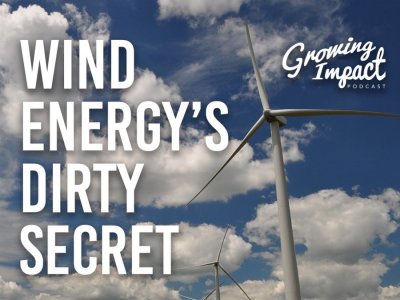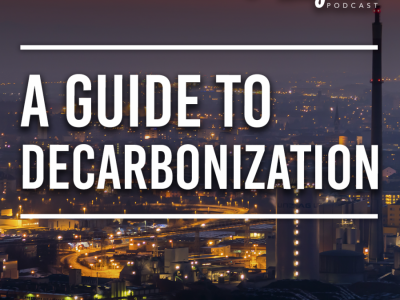Some countries in Africa and Asia have been locked into contracts that prevent improvements to existing electricity systems. Mohamed Badissy and his team are examining these contracts to find ways that could make these systems more efficient, sustainable, and cleaner.
Transcript
INTRO: It doesn't matter how normal electricity becomes a part of our daily lives, it's still a surprisingly complex marketplace.
HOST: Welcome to Growing Impact, a podcast by the Institutes of Energy and the Environment at Penn State. Growing Impact explores cutting-edge projects of researchers and scientists who are solving some of the world's most challenging energy and environmental issues. Each project has been funded through an innovative seed grant program that is facilitated through IEE. I'm your host, Kevin Sliman. Today on Growing Impact, we speak with Mohamed Rali Badissy, an Assistant Professor of Law at Penn State Dickinson Law. We are speaking about his project of investigating energy contracts of Sub-Saharan African countries in order to find ways to improve that country's efficiency or environmental impact from energy production.
HOST: Welcome to Growing Impact. Today on our episode, we have a Mohamed Rali Badissy, and we are speaking about his project, “Mapping Legal Liability from Power Market and Decarbonization Policies by African Governments.” So welcome to the show, Mohamed.
Mohamed Rali Badissy (MB): Thank you. I'm really excited for this conversation.
HOST: Let's talk about this project. As far as I can understand, it looks like these different countries, no matter what they would like to do, if they would like to try to head towards maybe something that is renewable or decarbonization or something like that where their energy is becoming, they're trying to make their energy use more efficient or reducing pollution, that they're actually stuck, and they're not able to make those changes. Is that accurate?
MB: That's exactly right. I mean, the core problem is that there's a big transition happening in the energy space, solar and wind, and all these new sources are coming online. There's the extra motivation sort of counteracting climate change and decarbonization. So there's a lot of big new things that countries are trying to do. The trouble is, is that it's hard to walk away from the market that you already have. They've already built a bunch of projects. Maybe they're coal projects or hydro projects, or even sometimes we're using diesel generators in a lot of these countries. And there's this problem where when they try to build the new and move in that direction, they have some legacy liabilities, what we'd say in the legal space from those old projects. So you can’t just shut down coal project because you don't like it anymore. Somebody built it, somebody paid for it, somebody's operating it. It's a business asset. And in this transition, this energy transition, that we’re all focused on these days, somebody has to account for that existing asset. And more importantly, for these countries, they've gotta be able to assess the liability of this transition because they might have a big bill waiting for them, a big cost in shutting down this old generation of infrastructure. Even though everybody is super excited about the new generation of lower-carbon and green energy that's coming.
HOST: So they have these agreements and they can be with anyone, right? They can be with a private contractor or an energy company that exists. Is that accurate?
MB: That's right. I mean, typically the way it is, especially the emerging markets that I focus on Sub-Saharan Africa, South and Southeast Asia, Central America, places like that. It's usually a government-owned utility, a government-owned power company that contracted with an investor, usually a foreign investor, to come in and build the power plant. And then they would buy the power from that plant and they would sell it to their customers. And so yes, it is usually where they call it project developer or some type of investor who's sitting on the other end of this transaction that's sitting there on the other end of the contract.
HOST: What is your project aiming to do? What goals do you have for your project?
MB: Well, I mean, in some ways, it's pretty simple. What it is, is we're trying to look at those contracts. We’re trying to look at the project contracts that had been signed in sort of a subsection of countries that we're sampling from over the last two or three decades to figure out what is the language in those contracts that allows for either renegotiation or possibly even termination. Another way to say that it just sort of plain-speak is, what would it cost to get out of those projects, to walk away from this project? And as you can imagine, when you're negotiating a deal, you’re not sitting there obsessing with shutting the thing down You’re thinking about the great future of getting it set up and running it for 30 years and how everybody is going to be happy with more electricity from coal or whatever the source may be. But now the trouble is, is when you do this backward-looking exercise, you find that a lot of these agreements don't have a lot of detail. We're trying to examine either directly or implicitly if there's not clear language in the contracts, what options the governments have. And you're trying to unwind some of these old projects. And if we can do a good job of that, if you can capture a sort of a pretty good understanding of what it would take to walk away, then we give the government some choices, right? You could, you could buy out the project. You could maybe just deprioritize it, let it sort of live out its days, but you're just not using the power anymore. You could convert it, you can. And there's sort of different choices in that space, but right now the governments don't even know what those choices are. A lot of them don't, a lot of them haven't even read their own contracts because they were signed 20 years ago by some past administration.
HOST: Are we talking primarily and did you say sub-Saharan Africa?
MB: That's a big part of the focus for our research just because of my own background, I‘ve done a lot of my work with Sub-Saharan African governments and I worked directly with a lot of governments there. But I think really any market that has experienced rapid growth, but still is primarily we call state-controlled with there's still a lot of state ownership of the infrastructure. And so that sub-Saharan Africa is a big example of that. But places like India and Nepal and South Asia, Vietnam and even Malaysia, places like that, and Southeast Asia, their experience, there are examples all around the world, but I think that governments that are most in danger of facing this big liability are governments in Sub-Saharan Africa, particularly East and West Africa.
HOST: Interesting. Is there any reason why East and West Africa are more in danger?
MB: Well, I mean, it's because they’re still, some of them are underdeveloped markets. Some of the bigger markets like South Africa, which is a sort of a pretty modern economy. It's a middle-income country. At this point. They've got a big enough power market where if one project sort of goes offline and more importantly, you know, there's a shift in the market. There's enough capacity there, there's enough scale in the marketplace that it's not disruptive, right? But if you're in a smaller country, think of a country like Malawi or Burundi, or even a sizable country, but it still doesn't have a fully developed energy market like Kenya. That transition away from the old generation of power to the new is pretty disruptive. You're talking about taking a big chunk of your existing power projects possibly offline. And more importantly, the bill, the cost possibly of this transition is, is sort of proportionately higher compared to your GDP than it would be in a larger economy and more advanced economy. Here in the US were facing the same problem, right? It's not like this is a unique situation in Sub-Saharan Africa. We've got a whole generation of coal power plants that we all know need to shut down sometime soon. Either because they're too dirty or actually frankly, they're too expensive. I mean, new sources of energy like solar are just becoming so much cheaper. But we can't just shut him down. It's a business; they’ve got rights. So we have an economy here where we can realistically think about, well, what if we bought out the cold project, right? We bu it out right now and over the next 20 years, we add just a little bit of payments to everybody's power bill to pay back the cost of that project that we had to buy out. We call that whole securitization that's sort of the legal word for it here in the US. And that's a very realistic thing. We can do that because we've got enough customers, we've got enough power flowing, enough size in our market that that little tiny payment on your bill isn't going to be a major problem doing a US customer. But again, proportionately to a Kenyan customer or a customer in Ghana or elsewhere, that may be a significant charge. That may be a significant liability—where that option isn't really there. You can’t just buy out the project because they just can't afford to, again, relative to the customer's ability to pay.
HOST: Could you talk to me a little bit about the interdisciplinary aspect of this?
MB: By its very nature, anything that's sort of the power sector or energy-related is interdisciplinary. I'm focused on the law and a regulation and the finance and that's sort of my background. But power itself is a sort of a technical challenge. The idea of actually building, operating, and delivering, this commodity and getting the electrons to flow down the wires. And so the complexity of the power projects. I work with some very smart engineers and other project developers who sort of explain to me why it's so hard to say even redesign, say a coal facility to make a greener or, you know, that kind of a challenge. And then on the climate side too, there’s some really hard math that you have to do here and sort of climate economists, but also sort of climate experts on the weather side, folks are predicting just how disruptive some of these climate adjustments will be. The map is like this for these governments are thinking, well, do I shut down these old dirty projects? Or do I focus on sort of these newer, greener projects? The math goes like this: They had to think about, well, what is the actual cost of climate change, right? If I keep running this power plant, what is the real cost in terms of maybe it's increased cases of asthma of folks nearby, increase in weather events, volatility. Maybe my crops become more unpredictable and it's worth it, but it's true and to an extent, it actually might be cheaper to keep running these plants if it's going to cost so much to shut them down, even though knowing full well that all these bad things are gonna happen. And so there's some very interesting financial and economic analysis that has to be done in there. And it takes an account, some social costs and some sort of macro and micro-level issues that are well beyond my capacity. So I rely very heavily on smart economists and folks who have the technical understanding of what the project and sort of the climate level, at the end of the day. I really love working with the governments that I work with because I know that they're in need of this information. They want to make smarter informed decisions. That, that's my favorite counterpart. But I really enjoy the community of experts as well. Even the students I have who help me with this research. I think they've grown their knowledge and they have made me think through some issues that I hadn't thought through before. And that kind of interaction is invaluable at the end of the day,
HOST: Mohamed says he has to sometimes remind himself of the interconnectedness of the research outcomes at a university like Penn State.
MB: We have amazing people doing research on climate science and sort of the future, you know, of what the Earth looks like in the next 10, 15, 100 years. We got brilliant people doing work on energy market regulation and economics here at the Center for Energy Law and Policy, doing great stuff there. We've got smart people doing work on the solar panels themselves, right? How do we build solar panels? I find it's funny. One of the luxuries we have, we have as lawyers is we think about the sort of the contract level where everything comes together as opposed to the individual components, the panels, the market, you know, the weather. And I sometimes nudge my colleagues, I think, in other interdisciplinary spaces to think about how their particular research or their particular knowledge could have a heavy impact on others. And so I like that we've built now this culture at the university around energy issues, the Energy University sort of banner that the President has put out for us. We've got all of these working groups. For example, we have a solar working group that I've been a part of and so that parts of it nice, but I think it's rather nascent, and I'm excited to see that grow because the interconnected nature. Again, I'm using these regulated markets, but it applies to other spaces to, is such that we would be irresponsible if we weren't doing more interdisciplinary research, if we weren't thinking through all the various implications of some of these really innovative insights that we're generating from our research. For me personally, and one of the reasons I was excited to do even join academia, but Penn State in particular, is there's certain credibility that comes from being in a public university. That's really important to the government that I work with, which is to say that they know we're not trying to push a technology or push a project or profit from anything, right? It's not even that we have like alumni who are on the, you know, in the backcountry of Kenya trying to pitch projects. There's a tremendous value and the trust that is placed in public universities, the credibility that we have. And it's helpful to me because these governments are being bombarded with all kinds of information from the investors, say, this is your best way forward. From sort of think tanks and other advocates saying, you know, you gotta pick this pathway to mitigate climate change. And it's hard, it's very, very hard for those governments. It's not a lack of information. It's a lack of credible information that's a struggle for some of these governments. And so I, I find myself being very thankful for the place that I sit because, you know, when I walk into a conversation with my Penn State hat on, I come into there as a trusted party. And that's really, really important, especially when you're dealing with governments in some of these emerging markets.
HOST: Thank you for listening to Growing Impact. Today we spoke with Mohamed Rali Badissy and his project “Mapping Legal Liability from Power Market and Decarbonization Policies by African Governments.” Thank you so much for being a part of the show today.
MB: Thank you for the opportunity. This is why we do the work to be able to share with others.
HOST: You've been listening to Growing Impact, a podcast by the Institutes of Energy and the Environment at Penn State. I've been your host, Kevin Sliman. This has been season 1, episode 4. Thank you for listening.








